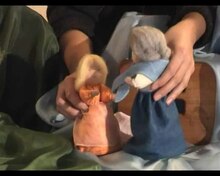Waldorf kindergarten
Waldorf kindergartens are institutions of anthroposophical education for preschool children. Some of them are affiliated with Waldorf schools , but more often they are independent institutions. There are 564 Waldorf kindergartens in Germany. Worldwide there are 1,817 Waldorf kindergartens in 67 countries (38 of them in Austria and 51 in Switzerland) (as of April 2018).
history
The first Waldorf kindergarten was established in 1920 in a room of the first Waldorf school in Stuttgart, which was attended by 33 children. The modest facility only existed for a short time as the space was needed by the expanding school. At Easter 1926, at the instigation of Elisabeth von Grunelius and Herbert Hahn, a kindergarten was opened on the grounds of the Stuttgart Waldorf School for the children of the employees of the Waldorf-Astoria cigarette factory . Other kindergartens soon followed, including in Brelau, Dresden and Hanover. The Nazi dictatorship banned anthroposophical pre-school facilities, albeit in different periods of time. It was not until 1941 that the Dresden-based Waldorf kindergarten was the last to be banned. After 1945, the Waldorf kindergarten in the FRG developed rapidly, while in the GDR no anthroposophically oriented preschool facilities were desired. In the FRG and after the reunification of the two German states, Helmut von Kügelgen in particular campaigned for the spread of the Waldorf kindergarten.
Educational concept
The educational concept in Waldorf kindergartens is less fixed than in Waldorf schools and is shaped by the respective educators . Core elements are fixed rhythms in the daily routine, in the weekly routine and a strong reference to the seasons. The most important approach in Waldorf education is imitation. This ability of the child “is not only directed towards things and events in the external world. Children perceive the atmosphere, the inner attitude and attitudes of the adults and imitate them too. ”The children are given a role model through the actions of the teachers. The toy is often non-representational and consists of natural materials such as wood, wool, felt, cloth, baskets with nut kernels and the like. Often, eurythmy is part of the daily or weekly routine.
“One of the forces that have a sculptural effect on the physical organs is enjoyment in and with the environment. Cheerful expressions of the educators and above all honest, no forced love. Such love, which warmly flows through the physical environment, in the true sense of the word incubates the forms of physical organs. If the imitation of healthy role models is possible in such an atmosphere of love, then the child is in the right element. "
Sponsorship
Waldorf kindergartens are mostly run by non-profit registered associations , which mainly consist of the parents (parents' initiative). The kindergartens are subsidized by the municipalities with cash and non-cash benefits. In some cases, the parents' contributions are higher than for municipal and church institutions. In addition, many parents participate in the design and maintenance of the kindergarten and are heavily involved. The involvement takes place in matters such as structural measures or financing plans, but not in the educational context.
literature
- Manfred Berger : "We need kindergartens!" The history of Waldorf reform pedagogy, in: PraxisKita 2019, pp. 6–9
- Ders .: Who is who of Waldorf Kindergarten education, in: PraxisKita 2019, pp. 10–11
- Ders .: “We need kindergartens! We need kindergartens! ”. A contribution to the history of the Waldorf kindergarten, in: Praxishandbuch Elementarpädagogik, Edition 8, 12/2018, pp. 1–22
- Marie-Luise Compani / Peter Lang (ed.): Waldorf kindergarten today. An introduction, Stuttgart 2015
- Wolfgang Sassmannshausen: Waldorf education in kindergarten, Freiburg / Brsg. 2015
- Sebastian Suggate: Waldorf Berlin 2015
Web links
- http://www.waldorfkindergarten.de/ International Association of Waldorf Kindergartens eV
- http://www.waldorfkindergartenseminar.de/ Free technical school for social education in Stuttgart
- https://www.nifbe.de/fachbeitraege/autorinnen-der-fachbeitraege?view=item&id=799:zur-geschichte-und-theorie-des-waldorfkindergartens&catid=37
Individual evidence
- ↑ Address directory of Waldorf schools, Waldorf kindergartens and training centers worldwide. April 1, 2018, accessed May 19, 2018 .
- ↑ cf. Berger 2019, p. 7 ff; see. Berger 2018, p. 1 ff.
- ↑ Website: Waldorf kindergarten seminar: Waldorf, what is it?
